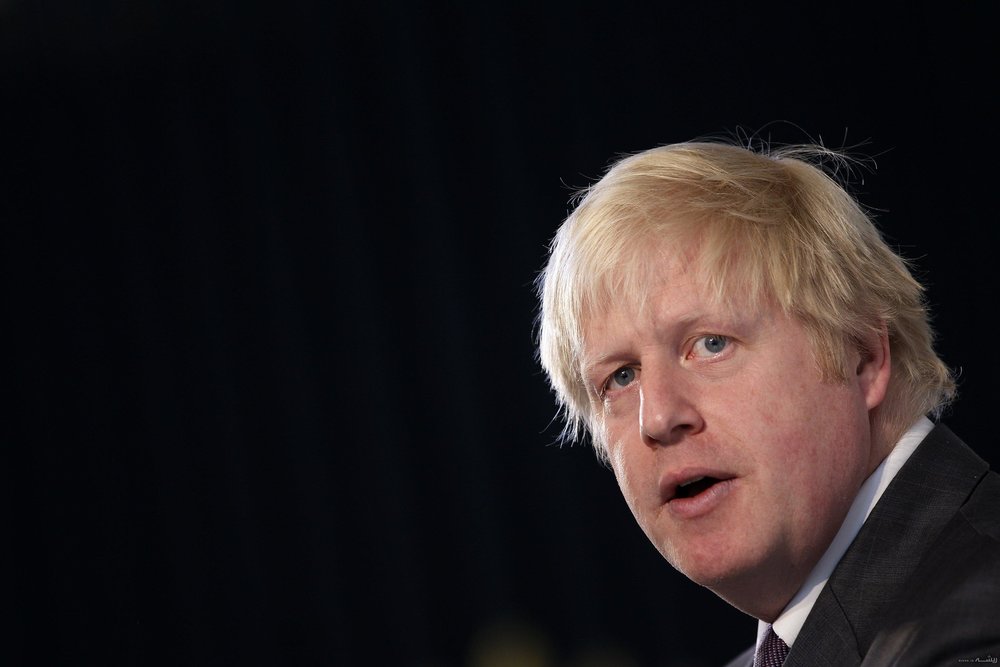Decoding Johnson's statements against Iran

On 5 march 1945, after the end of World War II, British Prime Minister Winston Churchill delivered his controversial speech at Westminster University.
There he mentioned: "From Stettin in the Baltic to Trieste in the Adriatic, an iron curtain has descended across the Continent. Behind that line lie all the capitals of the ancient states of Central and Eastern Europe.
Warsaw, Berlin, Prague, Vienna, Budapest, Belgrade, Bucharest and Sofia, all these famous cities and the populations around them lie in what I must call the Soviet sphere, and all are subject in one form or another, not only to Soviet influence but to a very high and, in many cases, increasing measure of control from Moscow. The United States stands at this time at the pinnacle of world power. It is a solemn moment for the American Democracy. This means a special relationship between the British Commonwealth and Empire and the United States."
Today, almost 73 years has passed since that famous speech. It has to be said that over the past seven decades, members of both Conservative and Labor parties in Britain have been committed to Churchill's recommendation. In this apparent equation, the UK has become a dependent variable to the United States, and analyzes any action, move or reaction in the international system based on its relationship with Washington. This rule also applies to the Joint Comprehensive Plan of Action (JCPOA). During his visit to the United States, the British Foreign Minister Boris Johnson, once again proved London's direct play on Washington's ground. Johnson first wrote at the beginning of a note in The New York Times:
"I believe that keeping the deal’s constraints on Iran’s nuclear program will also help counter Tehran’s aggressive regional behavior. I am sure of one thing: every available alternative is worse. The wisest course would be to improve the handcuffs rather than break them."
The British Foreign Secretary then uncovered his true face, and instead of "restraining Trump's nuclear ambitions ", he stressed:
What has been gained from the nuclear deal? Imagine all the mutually contaminating civil wars and internecine conflicts that rage across the Middle East today. Then turn the dial and add the possibility of a regional nuclear arms race triggered by Iran dashing for a bomb. That is the scenario which the agreement has helped to prevent. It has weaknesses, certainly, but I am convinced they can be remedied. Indeed at this moment Britain is working alongside the Trump administration and our French and German allies to ensure that they are.
Regarding Boris Johnson's sentences, we see that the truth is contrary to what the British authorities are trying to depict. Of course, decoding the measures of English officials is not so complicated! British authorities have preferred to help the White House at this period, and not to leave their traditional partner amid the war against the JCPOA. But the main question here is whether the prediction of British officials' arrangements to the benefit of the U.S. was basically possible. In other words, are these negative measures limited to the recent weeks or months? Were those really unprecedented? Could the Iranian diplomacy and foreign policy system expect the British authorities to adopt this approach?
The answer to this question is quite clear! The fact is that British officials have been cooperating with Trump since the beginning of his presence at the White House against the nuclear deal. This cooperation was made clear during Theresa May's first visit to Washington. On that trip (which took place in the beginning of 2017 and a few days after Trump's presidency), May referred to the JCPOA as a "controversial" agreement. Afterwards, London's conspiracies against the JCPOA have continued. In March 2017, the British Foreign Ministry identified Iran as a "challenging" place for business, in a statement that violated Articles 26 and 29 of the JCPOA. This is while according to the document, Britain and other players involved in the nuclear deal were pledged not to take any actions in preventing normalization of trade relations with Iran.
Last summer and during the United Nations General Assembly meeting in New York, senior British officials were committed to American and Zionist authorities to do their best to "change the nuclear accord", or "cancelling it ". In other words, British officials have promised Trump and Netanyahu to accept their final decision, even if it didn't agree with the JCPOA.
The speeches, arrangements, and even the moves of the British Foreign Secretary in confrontation with the JCPOA are all based on a "grand strategy" in British foreign policy. This grand strategy is nothing but their alliance with the United States of America. In this equation, the presence of Democrats or Republicans in power is not basically important. In this political deal, documents such as the JCPOA, though they are of high legal value, will be of no importance to the leaders of London and Washington.
Ultimately, Johnson's statements against Iran are "a clear indication" of the British's opposition to the Iranian government and nation. Undoubtedly, after Johnson's recent remarks, there should no longer be any mistakes in the diplomacy and foreign policy system of our country in recognizing London's real intentions, and in figuring out the true face of the British leaders! Boris Johnson described the "the JCPOA" as a pair of handcuffs that tied Iran's hands. This is while Johnson still has Churchill's handcuffs on his own hands! The British Foreign Secretary's recent visit to the United States was an opportunity to re-read and figure out the British true face. Obviously, in such circumstances, we can't and shouldn't count on London's cooperation to our country's international benefits. This is the one fact that the Iranian officials should be cautious about.
Leave a Comment